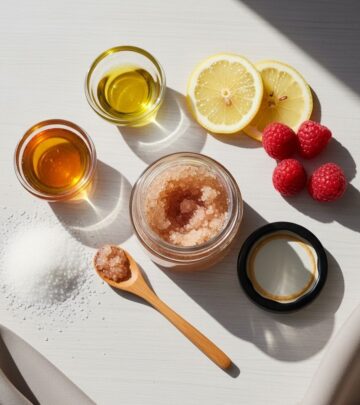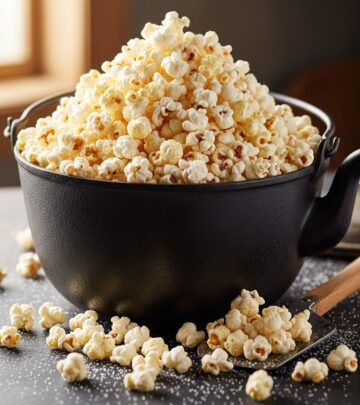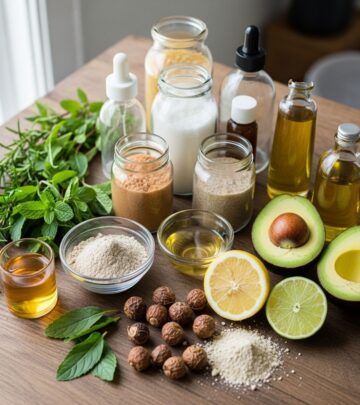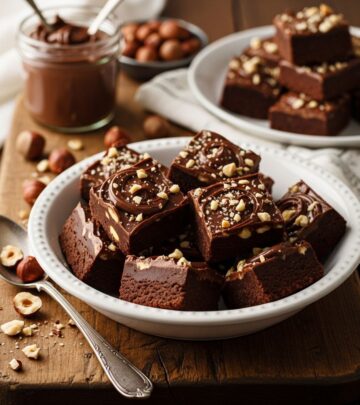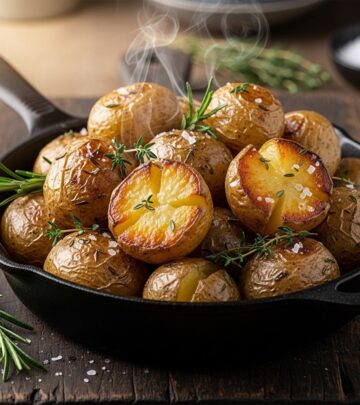Grilled Jerk Pork Skewers: A Bold Jamaican Classic for the Modern Grill
These bite-size delights pair bold spice paste with smoky char for memorable cookouts.
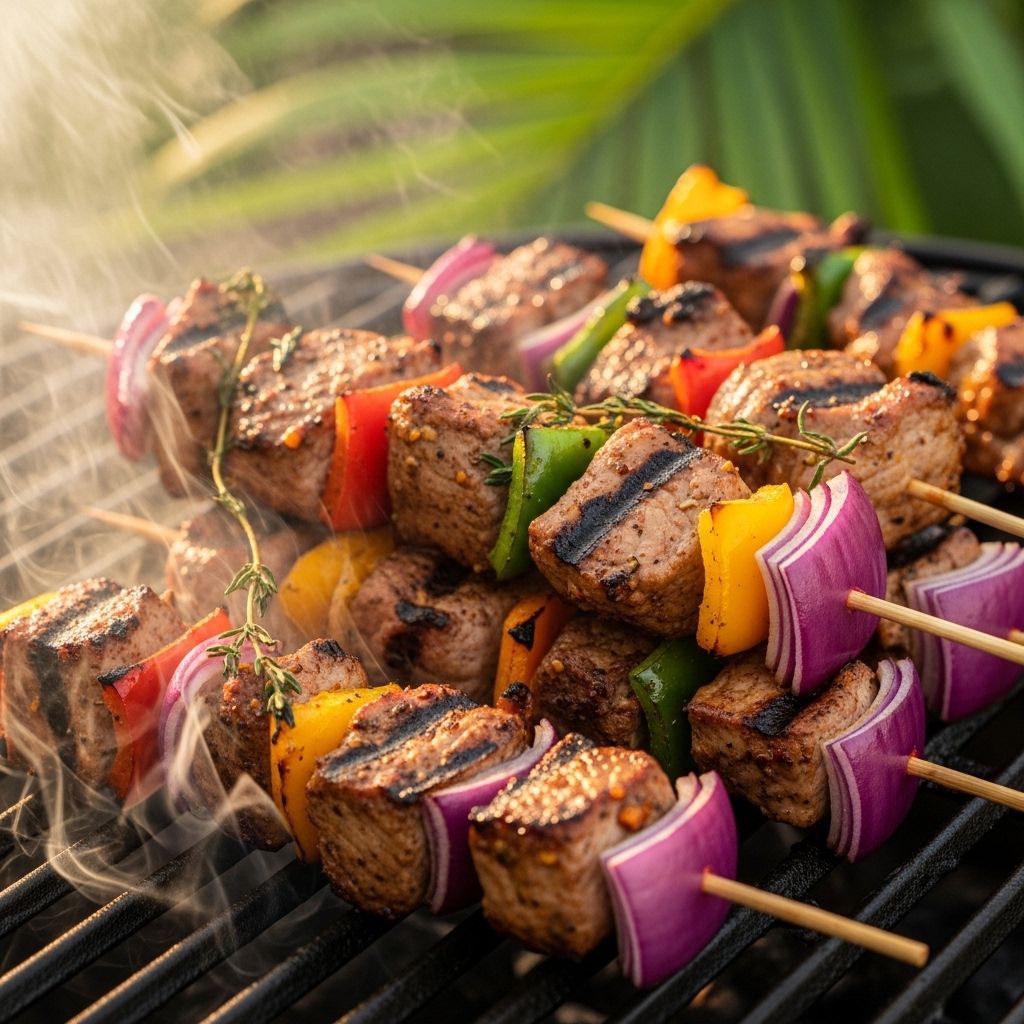
Grilled Jerk Pork Skewers: The Ultimate Guide
Caribbean cuisine’s intoxicating blend of smoke, heat, and spices is epitomized in Jamaican jerk pork. These grilled jerk pork skewers deliver all the beloved flavor in a convenient, fast-cooking package, making them perfect for any summer cookout or flavorful weekday meal. Here’s a deep dive into why jerk pork is so special, what makes a great jerk marinade, the grilling process step-by-step, and how you can master this classic at home.
What Is Jerk?
Jerk is much more than just a spice blend — it represents a cornerstone of Jamaican culinary heritage. The word “jerk” refers to the unique method of seasoning and cooking meat, most commonly pork or chicken, with a fiercely aromatic spice paste, then grilling it over pimento (allspice) wood for added smoky complexity.
- Origin: The term ‘jerk’ is believed to have evolved from the Spanish word “charqui,” meaning dried strips of meat. Jamaican people adapted the technique using local spices and slow-cooking over fire.
- Flavor Profile: The classic jerk profile is an intricate balance of spicy Scotch bonnet peppers, sweet and herbal notes, pungent alliums, aromatic thyme, and the sweet warmth of allspice berries.
- Cooking Method: Traditionally grilled over hardwood or allspice branches, jerk delivers a distinct smoky layer to already bold flavors.
The Essential Jerk Marinade: Key Components
The marinade is where jerk magic happens. While every cook boasts their own twist, most jerk marinades share several essential ingredients:
- Scotch Bonnet Peppers: These fiery chiles impart authentic heat. Habaneros can substitute if necessary, but lack the true fruity, floral punch.
- Allspice (Pimento) Berries: One of the defining flavors, allspice is sweet, warm, and slightly peppery. Ground allspice works if whole berries are unavailable.
- Aromatics: Garlic, scallions, and onions form the savory backbone.
- Herbs: Fresh thyme is traditional; dried thyme is acceptable in a pinch.
- Sweet/Tangy: Brown sugar adds both sweetness and caramelization, while lime juice or vinegar provides an acidic bite.
- Soy Sauce and Oil: These stabilize the paste, add depth, and help emulsify the marinade.
- Ginger, Nutmeg, Cinnamon: Warm spices round out the marinade for greater complexity.
Why Skewers?
Classic jerk pork is typically cut into large slabs and grilled slowly over a smoky fire. By threading smaller cubes onto skewers, you:
- Increase surface area for more marinade absorption and greater flavor penetration.
- Promote even, quick cooking, making each piece juicy and caramelized.
- Create a portable, shareable dish that’s perfect for parties or fast weeknight meals.
How to Choose the Right Pork for Jerk Skewers
The ideal pork cut for jerk skewers is one that retains juiciness under high heat, develops great char, and absorbs bold flavors:
- Pork Shoulder (Boston Butt): The top choice, offering marbled fat, deep pork flavor, and incredible tenderness when cooked properly.
- Pork Collar (Neck): Also highly marbled and flavorful, if available.
- Lean Cuts (pork loin, tenderloin): Not recommended for jerk skewers as they tend to dry out; if used, cook gently and marinate longer.
Preparation Tips
- Trim excess external fat but retain marble for flavor and moisture.
- Cut meat into even 1- to 1.5-inch cubes for uniform grilling.
The Ultimate Jerk Marinade Recipe
Here’s a typical template for a potent jerk marinade. Adjust the heat and sweetness to suit your taste:
- 6–8 scallions (green onions)
- 4 cloves garlic
- 1–3 Scotch bonnet peppers (seeds removed for less heat)
- 1 tablespoon fresh thyme leaves
- 1 tablespoon ground allspice (or 6–8 whole berries, ground)
- 2 teaspoons ground black pepper
- 1 teaspoon ground cinnamon
- 1 teaspoon ground nutmeg
- 2 tablespoons brown sugar
- 1/4 cup soy sauce
- 2 tablespoons vegetable oil
- 1/4 cup freshly squeezed lime juice or cider vinegar
- 1 medium onion, chopped
- 1 inch fresh ginger, peeled
Place all ingredients in a food processor or blender and pulse into a coarse paste. Taste for heat and adjust with extra pepper or sugar as needed. The mixture should be strong and aromatic, as some intensity will mellow on the grill.
Marinating the Pork: How Long & Key Tips
- For best results, toss the pork cubes in the marinade inside a large zip-top bag or mixing bowl. Massage to coat thoroughly.
- Marinate for a minimum of 4 hours, but overnight in the refrigerator delivers deeper flavor.
- Remove pork from the fridge 30–45 minutes before grilling; this takes off the chill for more even cooking.
- If using wooden skewers, soak them in water at least 30 minutes prior to grilling to prevent burning.
Grilling Jerk Pork Skewers: Step-by-Step
- Preheat Grill: Prepare a charcoal or gas grill for high direct heat. If possible, arrange for a two-zone fire (hot and cool areas) in case of flare-ups.
- Thread Pork: Skewer marinated pork cubes onto pre-soaked wooden or metal skewers, leaving a small gap between pieces for heat circulation.
- Grill: Place skewers over hottest section of the grill. Grill, turning every 2–3 minutes, for a total of 8–12 minutes or until pork is slightly charred and registers 145C internally.
- Baste (Optional): For extra sheen and spice, brush with reserved marinade halfway through grilling (discard any marinade that has contacted raw pork).
- Rest: Remove skewers from grill and let sit for 5 minutes before serving to keep juices locked in.
Pro Tip: If you want the classic “jerk crust,” resist moving the skewers too often; let them develop color before turning.
Jerk Pork Skewers: Serving Suggestions
Complement these bold skewers with classic Jamaican sides for a true island feast:
- Rice and Peas: Fragrant rice cooked with coconut milk and kidney beans.
- Fried Plantains: Slices of sweet plantain, fried until golden.
- Grilled Pineapple: Smoky, caramelized fruit adds cooling sweetness.
- Pickled Vegetables: Offer crisp, tangy balance to the heat.
Make-Ahead/Storage Tips
- You may marinate and skewer pork up to a day ahead; keep tightly covered in the refrigerator.
- Leftover cooked skewers will keep in the fridge for up to 3 days; reheat gently to preserve juiciness.
- Freezing: Marinated, uncooked pork can be frozen in the marinade for up to 2 months. Thaw completely before grilling.
Jerk Pork Skewers: Flavor Variations & Adaptations
- Chicken or Tofu: Substitute pork for skin-on chicken thighs or extra-firm tofu for equally tasty results.
- Vegetarian Option: Try zucchini, mushrooms, bell pepper, and onion brushed in jerk marinade for a spicy, plant-based appetizer.
- Extra Smokiness: Add soaked allspice berries or wood chips to your grill to emulate the traditional pimento wood.
- Softer or Hotter: Adjust chile and sugar in the marinade to suit your preferred heat and sweetness level.
Frequently Asked Questions (FAQs)
Can I make jerk pork skewers without a grill?
Yes. While grill flavor is traditional, you can use a cast iron grill pan indoors or broil the skewers in your oven. You’ll miss some smoke, but the jerk marinade still shines.
Are Scotch bonnet peppers necessary?
For authentic flavor, yes—and they offer spicy-sweet depth unique to Caribbean cuisine. If unavailable, substitute habaneros, but start with less—they often pack even more heat.
How do I keep pork skewers juicy?
Marinate thoroughly, cut pork to uniform size, and avoid overcooking—145C internal temperature is ideal. Let them rest before serving to preserve juices.
Can I freeze jerk pork in the marinade?
Absolutely. Combine pork and marinade in a freezer bag, freeze for up to two months, then thaw and grill as usual for excellent flavor retention.
Is jerk gluten-free?
Most jerk marinades are naturally gluten-free. Check your soy sauce or substitute with tamari or coconut aminos if needed.
Final Tips for Jerk Pork Success
- Balance the marinade to your taste: strong, salty, sweet, spicy, and acidic in equal measure.
- Let the grill do its work—leave room between pieces on skewers and avoid crowding so heat flows evenly.
- Always serve with something cooling and starchy to tame the heat; classic rice, fresh slaw, or plain yogurt work well.
- Pair with a cold, simple lager or sweet rum punch for the full Caribbean experience.
Nutritional Information
(Per serving; Approximate values based on 1/6th recipe prepared with pork shoulder)
| Calories | Protein | Fat | Carbs | Sugar |
|---|---|---|---|---|
| 320 | 28g | 18g | 9g | 3g |
Related Recipes
- Jamaican Jerk Chicken Thighs
- Grilled Pineapple Salsa
- Caribbean Rice and Peas
- Charcoal-Grilled Pork Shoulder
Bring the heat, savor the smoke, and enjoy the bold legacy of Jamaican jerk—now in quick-cooking skewer form, fit for any grill master’s table.
References
Read full bio of Sneha Tete


